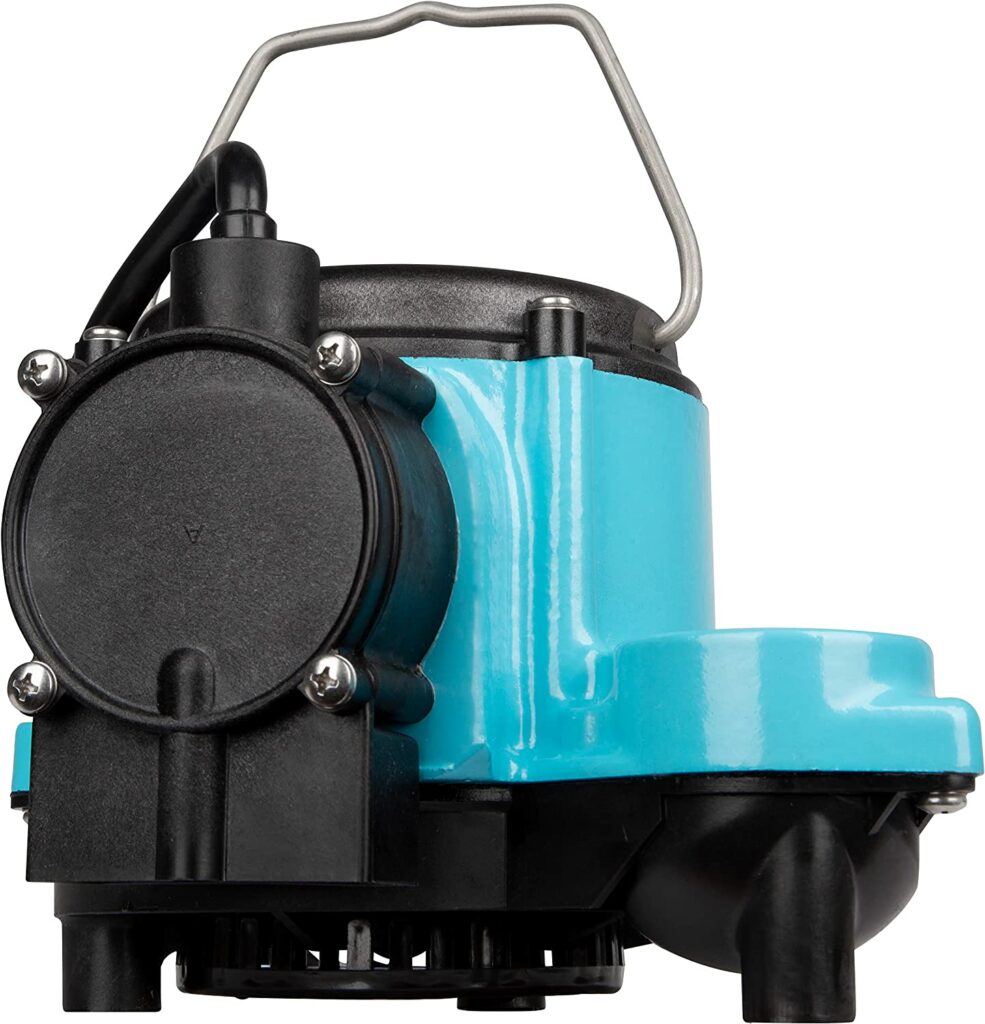For basement flooding, power outages, or even keeping your house dry in high-moisture areas, a sump pump is an easy and reliable way to keep your mind at ease and save your time and money. If you start looking at sump pumps, you will quickly find that there is a variety to choose from. By learning about all the features and circumstances each pump is built for, you can easily determine the right choice to protect your home before you’re in trouble.
Linquip can provide all the information over sump pumps that you need in one convenient space. As a result, our experts are always prepared to assist you so that you are able to get the most suitable sump pump for you. You may find it helpful to read Linquip’s article, “Pump: Working Principles, Function & Diagram,” in order to gain a basic understanding of these industrial devices.
Do you have any experience with them? Find the pump you’re looking for among Linquip’s selection of Special Purpose Pump Products. Looking for a specific sump pump type? Linquip’s platform allows free access to all available Special Purpose Pumps for Sale. It is also worth mentioning that if you’re interested in finding sump pump prices, you can do so by submitting a request/inquiry to all Special Purpose Pump Suppliers and Companies for free.
In this article, we look at various types of sump pumps and their features so you can hopefully find the best model for your basement. If you’re in the market for one of these devices, read on to learn more about what characteristics you should look for and discover why the sump pumps on this list are some of the best you can buy!
⇒ View a List of Pumps for Sale and Their Suppliers ⇐
Here are several types of sump pumps available and when to consider each type:
6 Type of Sump Pump are:
- Primary Sump Pumps
- Battery-Backup Sump Pumps
- Water-Powered Sump Pumps
- Combination Sump Pumps
- Sewage Pumps
- Effluent Sump Pumps
Primary Sump Pumps
Primary sump pumps are the standard pumps found in many residences. Designed to pump seepage water out of your basement, they prevent floods and keep your home safe and dry. These sump pumps cannot work without electricity, which is significant given that flooding often occurs during storms that knock out power. The following are two types of primary sump pumps:
-
Submersible Sump Pumps
If you live in an area with heavy rainfall or low elevation, you can spend a few extra dollars and bring home a heavy-duty submersible sump pump. These sump pumps are fully submerged in water at the bottom of the sump pit. Immediately when the pump detects water, it pumps the water out, then shuts off once the work is complete. Designed with high-powered motors, these pumps are able to pump thousands of gallons of water per hour.
These types of sump pumps filter out debris to prevent flooding and overflows, which are often caused by clogging. Submersible pumps are usually more expensive, more difficult to access, more powerful, more visually appealing, less susceptible to overheating, safer, and quieter than pedestal pumps. Leaks, housing damage, and motor failure make them shorter-lived. Most submersible sump pumps only have a life expectancy of 5 to 10 years.
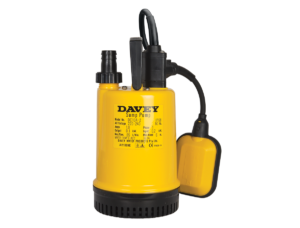
-
Pedestal Sump Pumps
Pedestal sump pumps are also known as upright pumps. They have an exterior motor, which is supported on a column attached to the casing of the pump. The motor is raised above the sump pit to keep it from coming into contact with water, while an extension of the shaft reaches down the pit so that it can access the water and filter it out. If you are on a strict budget or with low flooding basements, and you like the longevity and the lower price, pedestal sump pumps may be the right one for you.
Pedestal pumps are much easier to access, and more affordable but are noisier and less powerful compared to submersible pumps. They are ideal for small pits that don’t have enough space for the pump and its piping. Pedestal sump pumps can last two to three times longer than submersible sump pumps. These sump pumps have a life expectancy of 25 to 30 years.
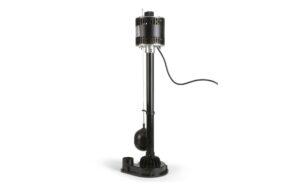
Battery-Backup Sump Pumps
Battery-backup sump pumps are best to use, as the name suggests, as a backup. These sump pumps are basically submersible pumps with a battery inside the case. These electric backup pumps are powered with a battery pack to provide extra protection, especially if there’s a power outage, or the primary pump fails, or when the water level exceeds the capacity of the primary pump. In these cases, the battery backup sump pump will start and automatically begin pumping the water out of your home.
They are less powerful and can’t perform the same as the main sump pump. These sump pumps are expensive, difficult to access, and do not last very long due to limited battery life. They also feature an alarm that alerts the moment they have to take over the duties of the primary pump. Typically, battery backup sump pumps can continue pumping from a sump pit for 12 hours without needing a recharge. During that 12 hours, over 11,000 gallons of water are able to be pumped out.
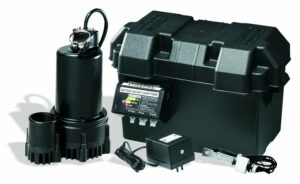
Water-Powered Sump Pumps
The water-powered sump pumps can also be a great option as a backup for other sump pumps in case of power outages due to intense storms. These pumps are less popular yet unique. They use water pressure from the municipal water source, which creates a vacuum, sucking the excess water from the sump pit.
These pumps have no motor, battery, or moving parts. They also don’t require maintenance. As a result, they have a long lifespan. It is pricey to run this type of pump since you have to pay for the excess water needed to create pressure. You require city water with high pressure because low water pressure compromises the efficiency of the pump. Since these sump pumps are powered by water pressure, they are not as powerful as submersible sump pumps. However, they can get the job done, especially in emergencies.
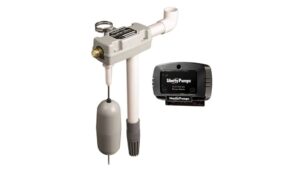
Combination Sump Pumps
These pumps are the result of combining a primary pump with a battery backup pump all in one package to give you a double amount of power. They are perfect for larger areas and prevent all flooding hazards and water damage in homes.
With Combination sump pumps, you are protected under normal circumstances and in power outages as well. Besides flood insurance, these are the pinnacle of home flood protection at all times.
Combination sump pumps are the most reliable of the lot. These types of sump pumps will need a bigger pit or basin.
Even though they cost more upfront, they are incredibly cost-effective. These pumps will especially be a great option if you can afford them.
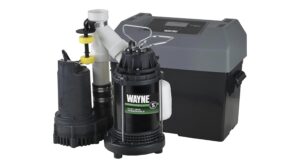
Sewage Pumps
Sewage pumps aren’t like traditional sump pumps although they could be used for this purpose. Rather, sewage pumps are primarily designed to pump sewage waste (liquids and solids) from a sewage basin to a public sewer system or a septic tank.
Usually found in residential applications, sewage pumps can pass solids up to two inches in diameter, which is one of the biggest differences between them and regular sump pumps. Once installed, sewage pumps run automatically. They can either be installed in the septic tank itself or a separate pump chamber.
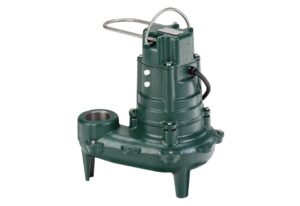
Effluent Sump Pumps
These pumps are also known as lift pumps. You may confuse effluent pumps with sewage pumps, but they do a different job altogether. These pumps are used in homes with an effluent tank or basin. Effluent pumps differ from sewage pumps in that they remove wastewater from bathroom sinks, laundry sinks, and showers. They then pump it into the leach field or effluent dispersal area. Once installed, these pumps run automatically.
Generally, effluent pumps are very durable if well-maintained. Depending on how frequently the tank fills up, and how hard the effluent pumps have to work when pushing gray water into the leach field, they can last for about 10 to 15 years. Once it comes to the end of their life, it’s better to replace rather than try to repair them.
What Is the Better Option, a Submersible or Pedestal Sump Pump?
A submersible sump pump is more powerful than a pedestal pump, and it can pump out solids and debris that may have found their way into your sump pit. Although they are more expensive, submersible pumps are well worth the investment.
What’s Better, Cast Iron or Stainless Steel Sump Pumps?
Cast iron is more efficient at cooling, improving heat dissipation from the motor. Stainless steel offers corrosion resistance, while cast iron is more efficient at dissipating heat.
Download PDF for TYPES OF SUMP PUMPS
This document can be downloaded as a PDF. You can access it by clicking the link below.
Conclusion
Since damage caused by water is incredibly costly and is a headache, it makes sense to invest in a sump pump. Knowing the types of sump pumps that are out there is crucial, and it’s also important to understand the features to consider when choosing among the most reliable sump pump options. Do your research before buying a sump pump since each has its pros and cons. Purchasing a sump pump that doesn’t meet your needs is just as bad as not having one. When choosing which of the different types of sump pumps are right for your home, consider all the factors that affect it, such as weather, frequent flooding, or power outages.
We hope this blog helps you not to worry about a flooded basement. Is there any question we can help you through? Feel free to sign up on our website to get the most professional advice from our experts.
Buy Equipment or Ask for a Service
By using Linquip RFQ Service, you can expect to receive quotations from various suppliers across multiple industries and regions.
Click Here to Request a Quotation From Suppliers and Service Providers
Read More on Linquip
- Pump: Working Principles, Function & Diagram
- Different Types of Pumps: Ultimate Guide in 2022
- Types of Fire Hydrant Systems
- Types of Piston Pumps
- 3 Types of Oil Pumps + Working Principle & PDF
- 5 Main Types of Fuel Pump & How They Works?
- 3 Types of Heat Pump + Working Principle ( Clear Guide)
- Types of Pump Casings (In Centrifugal Pumps & Others) + Pros & Cons
- 12 Parts of Sump Pump + Diagram
- How and When to Replace Your Sump Pump?
- Best Check Valve for Sump Pump: 9 of the Best Models
- What is Sump Pump and How Does It Work?
- Top Dosing Pump Manufacturers and Suppliers in 2022
- Top Water Pump Manufacturers and Suppliers in 2022
- The 7 Best RV Water Pump In 2022
- The 10 Best Electric Air Pump in 2022
- The Best HVAC Vacuum Pump in 2022
- 9 Different Types of Rotary Pumps + PDF
- The 5 Best Well Pump in 2022
- The 10 Best Condensate Pumps of 2022: A Complete Guide
- 13 Parts of Concrete Pump with Name & PDF
- 5 Types of Concrete Pumps + PDF
- Types of Centrifugal Pumps: All Classification & Working Principles

